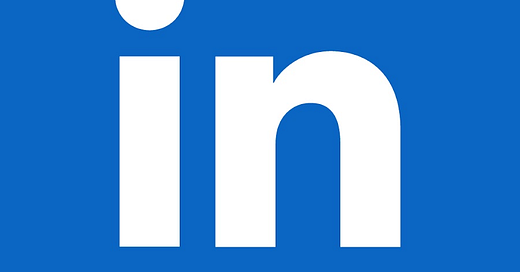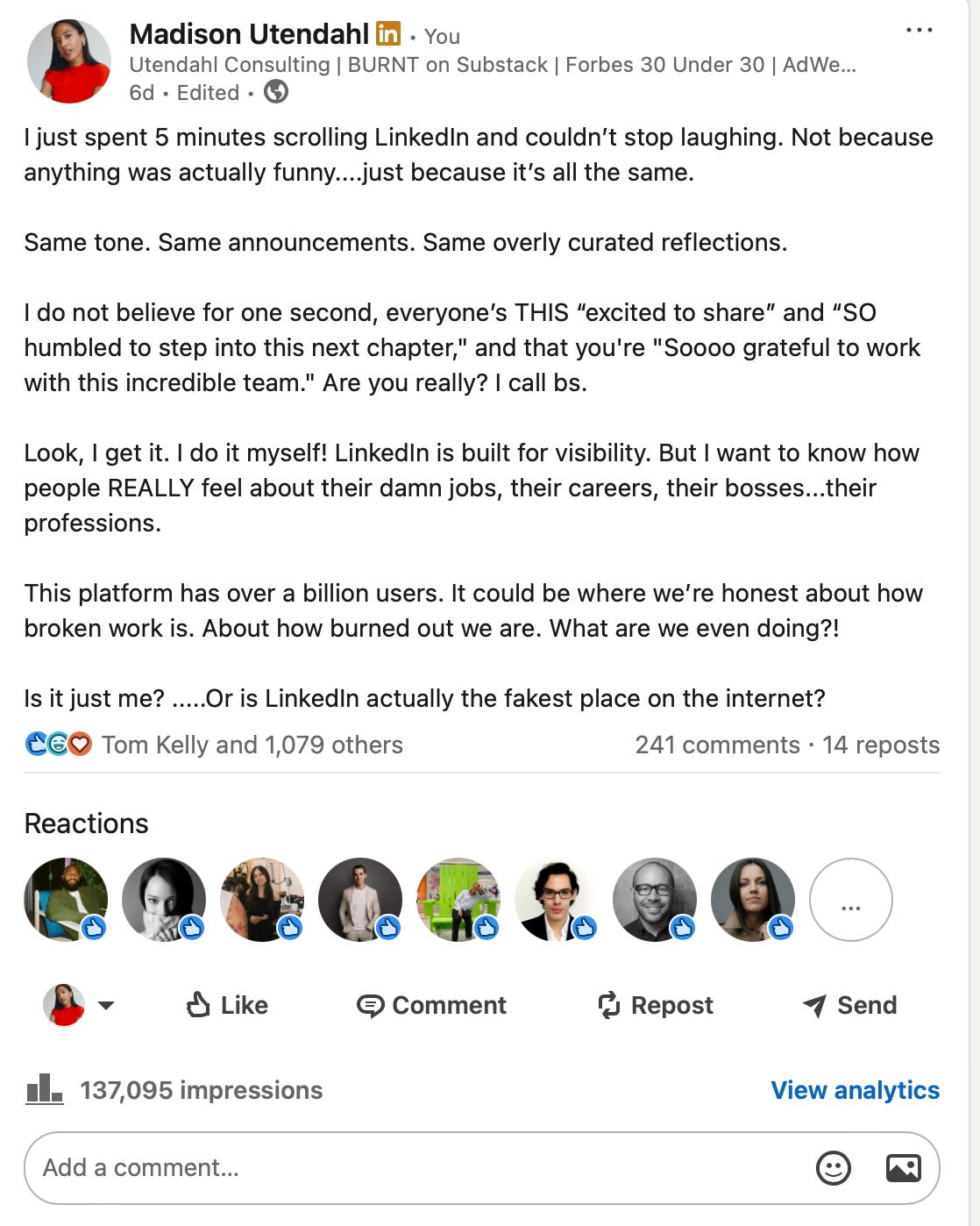Is LinkedIn The Fakest Place On The Internet?
Apparently pretending to love your job is now a content strategy
Every time I log onto LinkedIn, I feel physically annoyed, confused, unsettled…borderline allergic. It’s like walking into a corporate alternate reality where everyone is “beyond thrilled” to announce a promotion, “deeply honored” to join another advisory board, or “forever grateful” to be circling back on deliverables with their dream team.
I know, as do you, statistically, emotionally, spiritually, there is just no way this many people are this excited about work.
We drag Instagram and TikTok for being fake, filtered, and performative. And in many ways, they are. But they’re also chaotic, weird, unhinged. People cry on camera. They contradict themselves. They post thirst traps and then disappear for three months. There’s a spectrum of behavior. There’s nuance. There’s edge.
But LinkedIn? No irony. No resistance. No protest. Just a feed of templated announcements written in ChatGPT babble, pretending to be inspired by stakeholder alignment and calendar invites.
We love to complain about social media, and rightfully so. But where is the public reckoning with LinkedIn? Where is the honest conversation about how this platform has quietly become a professional cosplay arena, rewarding performance over substance, optics over reality, and silencing anyone who dares to say, “Actually, I’m struggling.”
A LOT OF STONG OPINIONS
Last week, on a sleepy Friday morning, I found myself scrolling through LinkedIn and immediately felt my usual frustration. However, this time, rather than logoff, I posted exactly how I felt. Considering the only people who usually respond to my rare and random LinkedIn posts are friends, or former colleagues, I was shocked on Saturday morning when I checked my inbox and saw that the post had gone viral.
The majority of comments and banter came from a profoundly large group of people who, like me, are fed up. Fed up with the tone, the templated cadence, the rinse-and-repeat language of “humbled to share” that’s become LinkedIn canon. These folks weren’t mad…they were relieved. They felt seen. Validated. Equally annoyed, equally disillusioned.
Then came The Defenders. The ones who reminded me that not everyone has the privilege of being honest online. That for many people, LinkedIn isn’t a platform for personality, it’s a lifeline. A place where being too real could cost you your job. And yes, I get that. I’m self-employed. I can speak freely here without fearing professional consequences. That’s a privilege, and I don’t take it lightly. It’s part of the reason I posted in the first place. But naming the system is not the same as shaming the people surviving within it. This was never about individuals doing what they have to do. It was about the machine we’re all plugged into.
Then there were The Pick-Me’s. The ones who didn’t just defend the users, they defended the platform itself. They brushed off the critique and said things like, “Not everyone’s a strong writer,” or “I love LinkedIn, people are doing their best.” And maybe they are. But again, this isn’t about who’s writing well or who deserves a moment. It’s about what Linkedin rewards. What it elevates. What kind of culture it incentivizes.
However, despite all of it, what surprised me most wasn’t what people said, it was who showed up. The diverse range of people who appeared in the comments. Funny people. Brilliant people. Weird, curious, irreverent, insightful people.. People with range. People with edge. People who clearly had more to say than what they usually post. And yet, most of the time, none of that shows up in our LinkedIn feeds.
Why?
1 BILLION PEOPLE?!
There are over 1 billion users on LinkedIn, and around 200 million in the U.S. alone. NO REALLY, 1 BILLION! What was once a glorified job board, is no longer about getting hired, it’s about being seen. Visibility. Virality. Optics.
I remember when LinkedIn actually worked. I was 23 years old, fresh out of undergrad, and applied to be a Creative Assistant at Refinery29. I got the job. It changed my life. It gave me lifelong mentors, friends, real experience, and the kind of opportunity people now spend years chasing. That’s what LinkedIn was good for: a place to be seen professionally.
While I understand that around 65 million people still use LinkedIn daily to search for jobs, the platform has failed its average user. I know people with over a decade of experience, stacked resumes, and real talent who can’t even land an interview. The algorithm buries them. The job market is oversaturated. And the only thing that seems to cut through is a templated, overly polished announcement that says absolutely nothing.
And the irony? Those posts rack up likes, but rarely lead to jobs.
If even half of those people got honest, truly honest, about what work actually feels like right now, we wouldn’t just have a trending post. We’d have an uprising. One that could shift how we connect. How we hire. How we lead. Instead, we stay trapped in the performance loop. But what if LinkedIn became the place we told the truth about our working lives? What if the future of work isn’t about visibility, but vulnerability?
So What’s Its Real Purpose?
Now, don’t get me wrong, LinkedIn does have some value. The one thing it gets right is connection. I still like seeing where people I once worked with end up. I like watching them thrive. I even pay for Premium, not to apply through the black hole that is LinkedIn Jobs, but to see who’s hiring so I can make real introductions when it counts. That part still works. Sort of.
But that’s it…And that’s not enough.
Because right now, we’re lost. We’re burned out. We’re holding up the illusion of professional success while quietly Googling “how to live on non-livable salary?”
Nearly 60% of U.S. workers say they’re emotionally detached from work, and 1 in 4 say they’re actively miserable. Real wages haven’t kept up with inflation. Layoffs come out of nowhere. According to the Economic Policy Institute, from 1979 to 2022, worker productivity rose over 64%, while hourly pay rose just 17%. In other words, we’re working harder, producing more, and getting less in return. Add to that the fact that since 2023, over 500,000 workers have been laid off in tech, media, and adjacent industries, with many finding out not from their manager, but from an expired login screen. And somehow, we’re still expected to smile and say we’re “thrilled to announce” whatever’s next.
LinkedIn could be more than that.
It could be where we question the systems that are failing us. Where we tell the truth about burnout, bad bosses, broken ladders, and the silent grief of watching your career stall despite doing everything right. Where people admit that working multiple jobs to stay afloat isn’t a "mindset", it’s economic survival. That imposter syndrome might just be the logical result of operating in workplaces never built for us in the first place.
It could be where we stop pretending and start rebuilding. Where instead of curating a feed of half-truths and high-performance, we share the reality of what it means to be working, building, and surviving in an economy that barely works for anyone under 40. LinkedIn could be the start of a workplace revolution. Hell, it could be world-changing, if we stopped performing and started being real.
If I’m honest, I’m contemplating deleting my Linkedin by the end of the year. Not as a statement. Not as a strategy. Just because my threshold for fake is maxed out. I frankly can only handle two performance platforms at a time, and right now, TikTok and Instagram are so much more fun.
So here’s my question:
Are you willing to be real on LinkedIn?
Or should we all just log off?
Before You Go
If any of this resonated with you, I’d love to hear more. I’m running a quick, anonymous survey to understand how people actually feel about LinkedIn, workplace culture, and the pressure to perform online. It takes less than 2 minutes, and your honesty helps shape what comes next.









This is really good writing, so astute
LinkedIn is awful. Basically similar to Facebook, which I never use. Have been laid off for months. Nothing happening. Rejection emails. Applications lost… it’s awful and does not help at all.